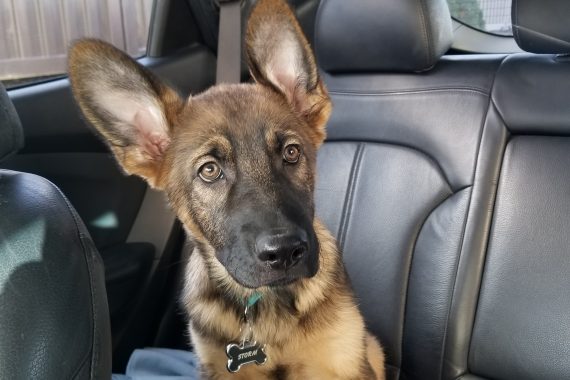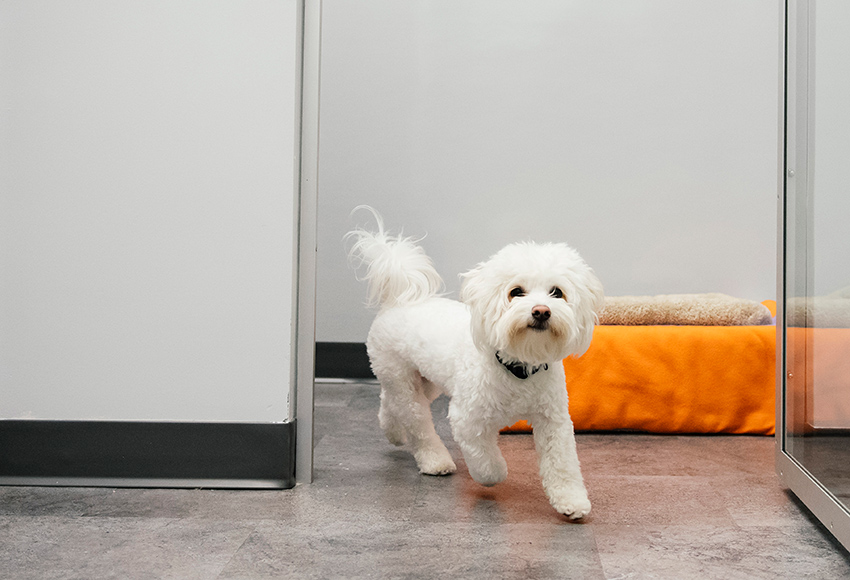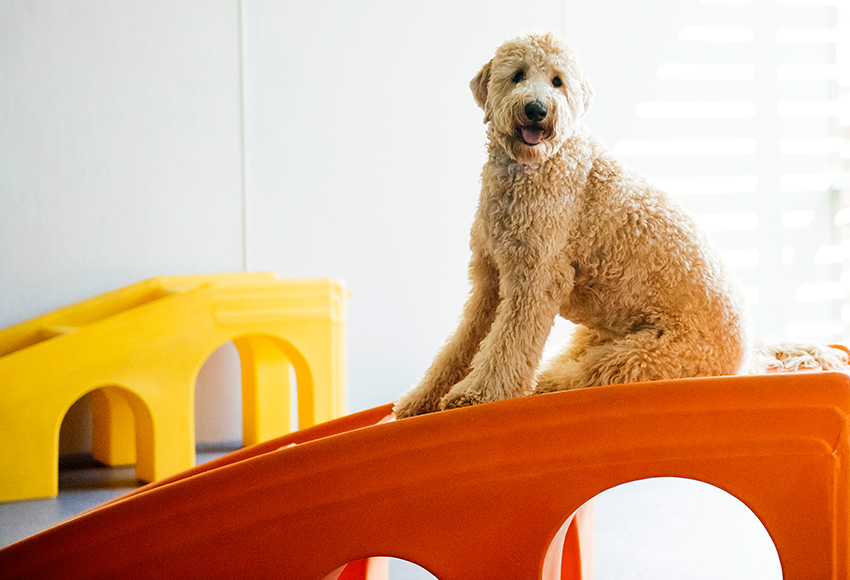THINKING OF BRINGING HOME A NEW PUPPY?
October 8, 2019

What you need to know to truly prepare yourself!
BY: COURTNEY JOHNStON
Everyone wants to feel the love and affection of coming home to a puppy. We all want to see their little tail wagging behind them as we walk through the door. Sure they may bark as a new pup, and they’re likely going to pee a little after realizing their parents have come home after 5 long minutes of going to the mailbox and back.
So you find a puddle, you can’t leave it there, but what do you use to clean it with? Is it best to use pine sol or vinegar? Do you know how you’re going to discipline your pup, if at all? How do you clean up the mess with a tail (pun intended) following you around? Do you put them in another room? Have you thought ahead and bought baby gates to prevent them from moving freely (and possibly quietly) throughout the house? If you’re questioning the answers to any of these, maybe it’s time to breathe and start researching, so you can best focus on the next step.
Finances
According to Ontario SPCA, the first year of owning a puppy can turn out to be quite an investment, with an estimate of about $3,000. This cost includes training classes, vaccines, and other essentials which I will go more in depth with later on.
I’ll break this down just a bit. When you first get your puppy, considering their needs from a medical standpoint can be a significant cost in the first year, and I’ll discuss this in the next section. However, what other costs should you be concerned about? Remember, when I talked about your puppy peeing after all that excitement? Well, a factor in training that many don’t think about until it’s too late is the cost and time needed to take your pup to obedience classes. Depending on where you go classes could be as much or as little as $300 (on top of the already $1,200 in medical bills). See where I’m going with this?
From here, you need to consider food, pet insurance, accessories, such as collars and leashes, toys, bedding, pet ownership license, and bowls. For the savvy shopper this may be more than manageable, but it is still a significant lump sum over the course of one year.
My recommendation: shop smart and ask questions. There are websites and shelters alike that are all more than happy to help you make the right decision and provide you with the information you need to make the right buy and safely support your puppy. However, if those aren’t your first concerns, maybe look into adoption as an option moving forward, as many animals (especially those past their first year) will already have many of those potential costs I listed already covered.
Medical
Medical costs can come in a few different packages, and there is a lot to consider when getting your first puppy. The essentials within the first year include: puppy vaccines, fecal exams, deworming medication, heartworm and flea prevention, microchip identification, spay or neuter, and any other unforeseeable medical emergencies. Each of these plays a key part in the protection of your new fur baby and should take priority before bringing them home.
Travel
As you get to know each other, you’ll start to understand the needs of your pup and they’ll begin to become comfortable with your expectations. Things like car rides, however, have the ability to throw off that comfort quite quickly. For many, whether animals or people, car rides can be quite comfortable, calming even. So, what do you do if your new puppy demonstrates the opposite behaviour?
Consider the following to help make the car a place they can feel safe:
- Take them for a walk or tire them out before travelling. By encouraging them to rest, there may be a chance you can help them ease their anxiety.
- If your puppy has shown signs of wanting to leap after every oncoming car, prepare for it in advance. Puppy seatbelts are an option if you can’t resist that happy look of your dog hanging their head out the window. And if that’s not an option, roll up the windows so there’s enough air flow to help satisfy their need of smelling everything but also not enough room for them to get out.
- Travelling with a crate and a blanket if also a good way of keeping them contained in a safe space without the need for worry.
Overall, travelling with your new puppy is likely going to be a bit of a learning curve, so take into consideration just how they might feel in this brand new situation and work together to find the best solution!
Health & Fitness
One of the last things I wanted to talk to you about is what it takes to keep this new little member of the household alive and thriving!
Here’s a small list of things to consider before moving ahead:
- Dog Food: Finding the most appropriate food for your fur baby can present quite a challenge for some! We want to give them the best of the best but we can’t always afford it. Do some research, try a few things and don’t be afraid to make things for them yourself. Do us one favour though, don’t experiment right away. Make sure your puppy starts off with all of their nutritional needs met first! This means asking a professional. Your vet should be able to recommend the best foods at economic pricing. Nutrition is important for many reasons like disease prevention, allergies and overall safety, so be mindful of what you’re providing them.
- Dog First Aid: This might sound strange but it is important. Dogs (especially puppies) are curious and much like human children are going to want to put EVERYTHING in their mouth. They are also likely to be clumsier, and more experimental than older dogs, after all that is how they learn. Being forward thinking and preparing means less worry down the line. So when your dog steps on something, plays around a little too hard or eats something they shouldn’t, prepare ahead of time so that you are best equipped with the knowledge to help them. First aid courses can be found online through St. John’s Ambulance or the Humane Society, both of which I have linked below.
- Regular Upkeep: While your local Dogtopia has the care options you need for bathing, nail care and other pet care amenities, they may not always be available to you right when you need them, so it is recommended that you learn the basics. Knowing what’s normal for your dog in terms of their hearing or the ways their paws look can be important in preventing problems down the line, so get familiar. Don’t be afraid to check out their paws, or the ways their ears look. Nail, dental, musculoskeletal, eye and paw care are a few of the personal care areas that you’ll need to learn about in order to keep your pup healthy. If you don’t know the answers right away, never feel afraid to ask your vet or those at Dogtopia. After all, that’s what we’re here for!
- Activity: This is an aspect of care. Many people forgo conducting research prior to acquiring a dog. It is important to ensure that they get the right amount of exercise and space to roam. Before committing, do some soul searching and look into the different breeds so that you can give and guarantee them your very best care. You wouldn’t want an active dog like a Leonberger cooped up for 12 hours in your small one bedroom apartment, but maybe a smaller dog, like the intelligent french bulldog, would better fit your lifestyle. It is important to consider the needs of the animal first. No matter how much you have your eyes set on a breed, be considerate of your own activity level and the size of the space they’ll get to use. This will be best for you both in the long run.
Essentials for the first week at home
- Food and water dog bowl (solid base recommended)
- Dog food
- Collar
- Leash
- Puppy friendly toys
- Puppy safe treats
- Grooming supplies: shampoo, conditioner, brush
- Bedding
- Dog proofing needs: baby gates, childproof latches on cupboards and doors you don’t want them getting into (MAKE IT SAFE! They will find ways to get into trouble if you don’t)
- Puppy crate (this may not seem fair but a crate is a perfect way to provide your fur baby with a space of their own, a safe space they can go to relax. This could be beneficial many times down the road)
- Find a vet that works for you! You’ll be seeing them regularly (especially in the first year), so make sure you like them!
- Pet First Aid! (Link to sign up below)
Educate yourself!
Dog Breeds- American Kennel Club
Pet First Aid- St. John’s Ambulance
Cesar’s Way- Great for questions if you just aren’t sure!
For those of you who aren’t quite sure how to pamper your pet; nail care, teeth brushing and other forms of grooming are often offered at our spa locations!
https://www.dogtopia.com/lionhead/dog-spa/







